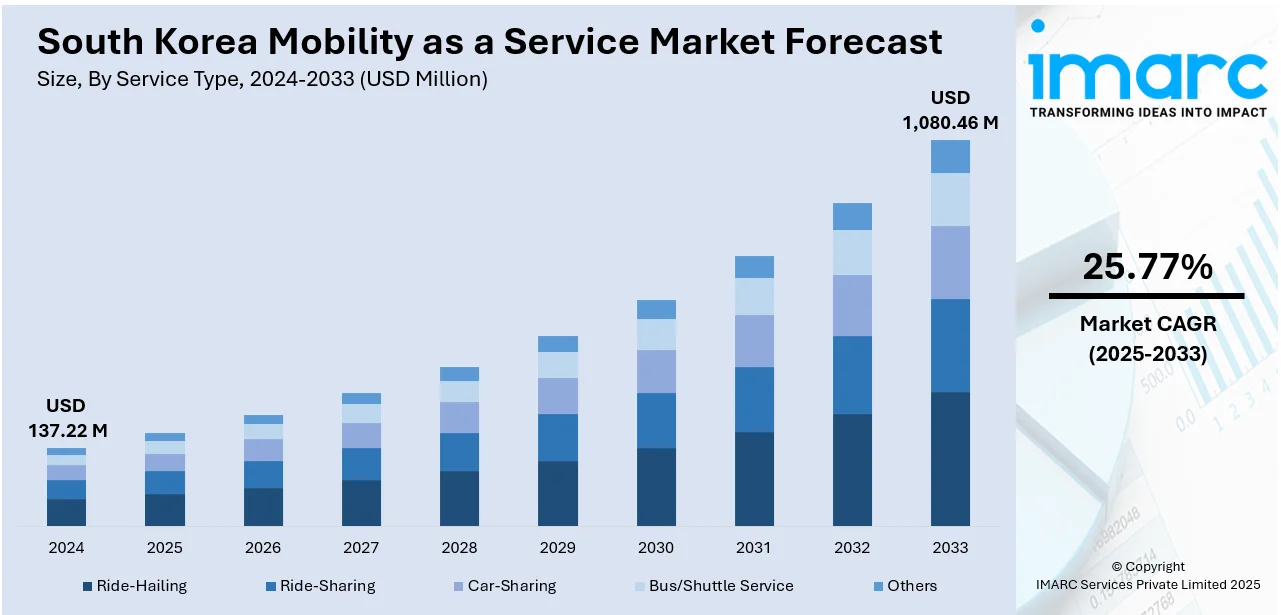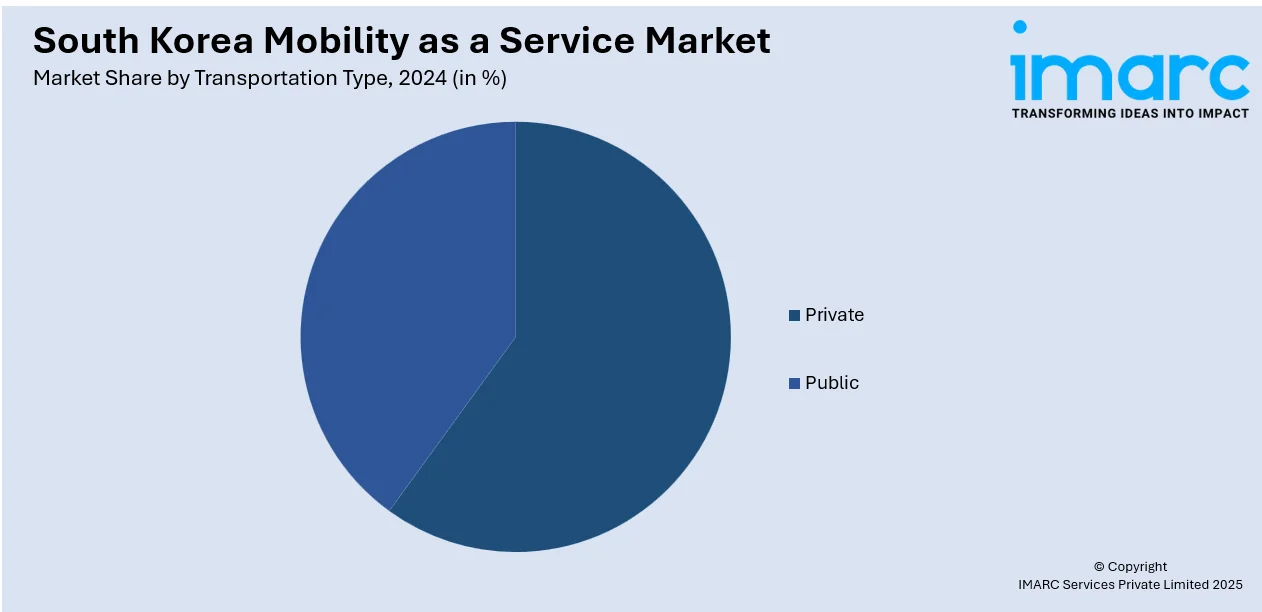
South Korea Mobility as a Service Market Size, Share, Trends and Forecast by Service Type, Transportation Type, Application Platform, Propulsion Type, and Region, 2025-2033
South Korea Mobility as a Service Market Overview:
The South Korea mobility as a service market size reached USD 137.22 Million in 2024. Looking forward, the market is expected to reach USD 1,080.46 Million by 2033, exhibiting a growth rate (CAGR) of 25.77% during 2025-2033. The market is gaining momentum as urban commuters increasingly seek integrated, on-demand, and eco-friendly transport solutions. The convergence of ride-hailing, public transit, bike-sharing, and digital payment systems into single platforms is improving convenience and reducing reliance on private vehicles. Advancements in mobile technology and smart infrastructure are further enhancing adoption, contributing to the expanding South Korea mobility as a service market share.
|
Report Attribute
|
Key Statistics
|
|---|---|
|
Base Year
|
2024 |
|
Forecast Years
|
2025-2033
|
|
Historical Years
|
2019-2024
|
| Market Size in 2024 | USD 137.22 Million |
| Market Forecast in 2033 | USD 1,080.46 Million |
| Market Growth Rate 2025-2033 | 25.77% |
South Korea Mobility as a Service Market Trends:
Integrated Travel Platforms
A key trend propelling the Mobility as a Service (MaaS) market in South Korea is the emergence of integrated travel platforms. These comprehensive applications enable users to plan, book, and pay for an entire trip using various modes of transportation such as buses, subways, taxis, and shared bikes through a single interface. For instance, Korail's travel platform, Korail MaaS, surged to over 5.78 million uses within six months of its June 2024 launch. The app offers real-time train tracking, parking prepayments, and airport bus reservations, with significant increases in rental car bookings and international airline partnerships, enhancing tourist convenience. This seamless connectivity boosts commuter convenience and enhances urban mobility by decreasing dependence on personal vehicles. The increasing demand for convenient, time-saving options is driving collaboration between public transit authorities and private companies to develop these platforms. Typically, these apps feature real-time tracking, cost comparisons, and route optimization, catering to tech-savvy and environmentally conscious users. As multimodal integration becomes standard, it is anticipated to play a crucial role in accelerating South Korea mobility as a service market growth in the years ahead.

To get more information on this market, Request Sample
Personalized Mobility Services
The Mobility as a Service (MaaS) sector in South Korea is increasingly focusing on personalized mobility solutions to cater to the changing needs of commuters. Utilizing sophisticated algorithms and user insights, MaaS platforms are now able to suggest customized travel routes, modes of transportation, and departure times that align with individual preferences, daily habits, and real-time conditions. For instance, in September 2023, Tmap Mobility, a South Korean transportation platform, launched an AI-enhanced navigation app that personalizes services like public transit routing and travel bookings. The revamped TMAP combines car and public transport options, including an airport bus and bike-sharing, while expanding offerings for restaurants, hotels, and attractions. Whether a user prioritizes speed, cost efficiency, or eco-friendliness, these systems adjust to provide a tailored experience. This high level of personalization enhances convenience and promotes sustained usage by aligning transport options with users' lifestyles. Moreover, these services have a tendency to evolve, improving their suggestions over time as they learn from ongoing user interactions. As urban areas become increasingly interconnected and travelers look for more efficient solutions, the need for intelligent, consumer-focused mobility planning is anticipated to rise, further driving the innovative growth of South Korea's MaaS market.
South Korea Mobility as a Service Market Segmentation:
IMARC Group provides an analysis of the key trends in each segment of the market, along with forecasts at the country and regional levels for 2025-2033. Our report has categorized the market based on service type, transportation type, application platform, and propulsion type.
Service Type Insights:
- Ride-Hailing
- Ride-Sharing
- Car-Sharing
- Bus/Shuttle Service
- Others
The report has provided a detailed breakup and analysis of the market based on the service type. This includes ride-hailing, ride-sharing, car-sharing, bus/shuttle service, and others.
Transportation Type Insights:

- Private
- Public
A detailed breakup and analysis of the market based on the transportation type have also been provided in the report. This includes private and public.
Application Platform Insights:
- Android
- iOS
- Others
The report has provided a detailed breakup and analysis of the market based on the application platform. This includes android, iOS, and others.
Propulsion Type Insights:
- Electric Vehicle
- Internal Combustion Engine
- Others
A detailed breakup and analysis of the market based on the propulsion type have also been provided in the report. This includes electric vehicle, internal combustion engine, and others.
Regional Insights:
- Seoul Capital Area
- Yeongnam (Southeastern Region)
- Honam (Southwestern Region)
- Hoseo (Central Region)
- Others
The report has also provided a comprehensive analysis of all the major regional markets, which include Seoul Capital Area, Yeongnam (Southeastern Region), Honam (Southwestern Region), Hoseo (Central Region), and others.
Competitive Landscape:
The market research report has also provided a comprehensive analysis of the competitive landscape. Competitive analysis such as market structure, key player positioning, top winning strategies, competitive dashboard, and company evaluation quadrant has been covered in the report. Also, detailed profiles of all major companies have been provided.
South Korea Mobility as a Service Market News:
- In July 2025, GS Engineering & Construction partnered with UI Group, signing a Memorandum of Understanding to enhance South Korea's Urban Air Mobility sector. The collaboration focuses on developing vertiports and integrating eVTOL aircraft into airspace, promising economic growth, job creation, and a transformative impact on urban transportation in the country.
- In June 2025, Seoul's Dongjak District announced its plans to launch a free self-driving shuttle bus service. The 1.62-kilometer route connects Soongsil University and Chung-Ang University, operating on weekdays. After test rides, the service opens to all, with future expansions planned in other districts.
- In May 2025, Diriyah Company partnered with Kakao Mobility to enhance mobility solutions. Their MoU focuses on developing smart parking technologies and digital platforms to improve transportation efficiency. This initiative aims to attract over 50 million visitors annually by 2030, boosting the local economy and job creation.
South Korea Mobility as a Service Market Report Coverage:
| Report Features | Details |
|---|---|
| Base Year of the Analysis | 2024 |
| Historical Period | 2019-2024 |
| Forecast Period | 2025-2033 |
| Units | Million USD |
| Scope of the Report |
Exploration of Historical Trends and Market Outlook, Industry Catalysts and Challenges, Segment-Wise Historical and Future Market Assessment:
|
| Service Types Covered | Ride-Hailing, Ride-Sharing, Car-Sharing, Bus/Shuttle Service, Others |
| Transportation Types Covered | Private, Public |
| Application Platforms Covered | Android, iOS, Others |
| Propulsion Types Covered | Electric Vehicle, Internal Combustion Engine, Others |
| Regions Covered | Seoul Capital Area, Yeongnam (Southeastern Region), Honam (Southwestern Region), Hoseo (Central Region), Others |
| Customization Scope | 10% Free Customization |
| Post-Sale Analyst Support | 10-12 Weeks |
| Delivery Format | PDF and Excel through Email (We can also provide the editable version of the report in PPT/Word format on special request) |
Key Questions Answered in This Report:
- How has the South Korea mobility as a service market performed so far and how will it perform in the coming years?
- What is the breakup of the South Korea mobility as a service market on the basis of service type?
- What is the breakup of the South Korea mobility as a service market on the basis of transportation type?
- What is the breakup of the South Korea mobility as a service market on the basis of application platform?
- What is the breakup of the South Korea mobility as a service market on the basis of propulsion type?
- What is the breakup of the South Korea mobility as a service market on the basis of region?
- What are the various stages in the value chain of the South Korea mobility as a service market?
- What are the key driving factors and challenges in the South Korea mobility as a service market?
- What is the structure of the South Korea mobility as a service market and who are the key players?
- What is the degree of competition in the South Korea mobility as a service market?
Key Benefits for Stakeholders:
- IMARC’s industry report offers a comprehensive quantitative analysis of various market segments, historical and current market trends, market forecasts, and dynamics of the South Korea mobility as a service market from 2019-2033.
- The research report provides the latest information on the market drivers, challenges, and opportunities in the South Korea mobility as a service market.
- Porter's five forces analysis assist stakeholders in assessing the impact of new entrants, competitive rivalry, supplier power, buyer power, and the threat of substitution. It helps stakeholders to analyze the level of competition within the South Korea mobility as a service industry and its attractiveness.
- Competitive landscape allows stakeholders to understand their competitive environment and provides an insight into the current positions of key players in the market.
Need more help?
- Speak to our experienced analysts for insights on the current market scenarios.
- Include additional segments and countries to customize the report as per your requirement.
- Gain an unparalleled competitive advantage in your domain by understanding how to utilize the report and positively impacting your operations and revenue.
- For further assistance, please connect with our analysts.
 Request Customization
Request Customization
 Speak to an Analyst
Speak to an Analyst
 Request Brochure
Request Brochure
 Inquire Before Buying
Inquire Before Buying




.webp)




.webp)












